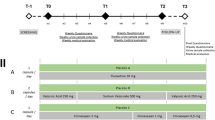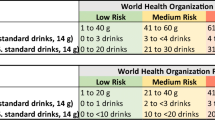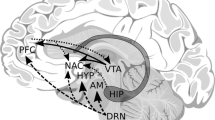Abstract
Acamprosate (Campral®, Aotal®, Regtect®) is one of a limited number of pharmacological treatment options approved as an adjunct to psychosocial interventions to facilitate the maintenance of abstinence in alcohol-dependent patients. It has been used in Europe, the USA and other countries for many years and was recently approved for this indication in Japan. In several randomized, double-blind, placebo-controlled trials (without active comparators), acamprosate in conjunction with psychosocial therapy for 3–12 months was generally significantly better than placebo plus psychosocial interventions in improving various key outcomes, including the proportion of patients who maintained complete abstinence from alcohol (complete abstinence rate), the mean cumulative abstinence duration, the percentage of alcohol-free days and the median time to first drink. Acamprosate as an adjunct to psychosocial interventions also demonstrated efficacy in some randomized, active-comparator trials of similar duration. Although results were not always consistent across individual trials, overall findings were generally favourable for acamprosate in a recent meta-analysis, which showed that alcohol-consumption outcomes were similarly improved with acamprosate or naltrexone. Acamprosate is generally well tolerated, has a low propensity for drug interactions and may be used without dosage adjustment in patients with mild to moderate hepatic impairment, although dosage adjustments or contraindications are recommended in patients with renal impairment. Thus, the use of acamprosate as an adjunct to psychosocial interventions in alcohol-dependent patients provides modest but potentially valuable improvements in alcohol-consumption outcomes and is generally well tolerated.

Similar content being viewed by others
References
Jonas DE, Amick HR, Feltner C, et al. Pharmacotherapy for adults with alcohol-use disorders in outpatient settings. Comparative effectiveness review no. 134. Agency for Healthcare Research and Quality publication no. 14-EHC029-EF. 2014 May. www.effectivehealthcare.ahrq.gov/reports/final.cfm. Accessed 2015 May 18.
World Health Organization. Global status report on alcohol and health. 2014. http://www.who.int/substance_abuse/publications/global_alcohol_report/msb_gsr_2014_1.pdf. Accessed 2015 May 18.
Centers for Disease Control and Prevention. Alcohol use and your health. http://www.cdc.gov/alcohol/fact-sheets/alcohol-use.htm. Accessed 2015 May 18.
Johnson BA. Update on neuropharmacological treatments for alcoholism: scientific basis and clinical findings. Biochem Pharmacol. 2008;75(1):34–56.
Lingford-Hughes AR, Welch S, Nutt DJ. Evidence-based guidelines for the pharmacological management of substance misuse, addiction and comorbidity: recommendations from the British Association for Psychopharmacology. J Psychopharmacol (Oxf). 2004;18(3):293–335.
US Department of Health and Human Services National Insitutes of Health. Helping patients who drink too much: a clinician’s guide. 2008. www.niaaa.nih.gov/guide. Accessed 2015 May 18.
National Institute for Health and Care Excellence. Alcohol-use disorders: diagnosis, assesment and management of harmful drinking and alcohol dependence. 2011. http://www.nice.org.uk/guidance/cg115. Accessed 2015 May 18.
Mason BJ, Heyser CJ. Acamprosate: a prototypic neuromodulator in the treatment of alcohol dependence. CNS Neurol Disord Drug Targets. 2010;9(1):23–32.
Campral (acamprosate calcium) delayed-release tablets: US prescribing information. 2012. http://pi.actavis.com/data_stream.asp?product_group=1928&p=pi&language=E. Accessed 2015 May 18.
Kalk NJ, Lingford-Hughes AR. The clinical pharmacology of acamprosate. Br J Clin Pharmacol. 2014;77(2):315–23.
Spanagel R, Vengeliene V. New pharmacological treatment strategies for relapse prevention. Curr Top Behav Neurosci. 2013;13:583–609.
De Witte P, Littleton J, Parot P, et al. Neuroprotective and abstinence-promoting effects of acamprosate: elucidating the mechanism of action. CNS Drugs. 2005;19(6):517–37.
Harris BR, Prendergast MA, Gibson DA, et al. Acamprosate inhibits the binding and neurotoxic effects of trans-ACPD, suggesting a novel site of action at metabotropic glutamate receptors. Alcohol Clin Exp Res. 2002;26(12):1779–93.
Rammes G, Mahal B, Putzke J, et al. The anti-craving compound acamprosate acts as a weak NMDA-receptor antagonist, but modulates NMDA-receptor subunit expression similar to memantine and MK-801. Neuropharmacology. 2001;40(6):749–60.
Oka M, Hirouchi M, Tamura M, et al. Acamprosate monocalcium bis(3-acetamidopropane-1-sulfonate) reduces ethanol-drinking behavior in rats and glutamate-induced toxicity in ethanol-exposed primary rat cortical neuronal cultures. Eur J Pharmacol. 2013;718(1-2-3):323–31.
Spanagel R, Kiefer F. Drugs for relapse prevention of alcoholism: ten years of progress. Trends Pharmacol Sci. 2008;29(3):109–15.
Mann K, Kiefer F, Spanagel R, et al. Acamprosate: recent findings and future research directions. Alcohol Clin Exp Res. 2008;32(7):1105–10.
Spanagel R, Pendyala G, Abarca C, et al. The clock gene Per2 influences the glutamatergic system and modulates alcohol consumption. Nat Med. 2005;11(1):35–42.
Umhau JC, Momenan R, Schwandt ML, et al. Effect of acamprosate on magnetic resonance spectroscopy measures of central glutamate in detoxified alcohol-dependent individuals: a randomized controlled experimental medicine study. Arch Gen Psychiatry. 2010;67(10):1069–77.
Spanagel R, Vengeliene V, Jandeleit B, et al. Acamprosate produces its anti-relapse effects via calcium. Neuropsychopharmacology. 2014;39(4):783–91.
Heilig M. Acamprosate: an alcoholism treatment that may not be what we thought. Neuropsychopharmacology. 2014;39(4):781–2.
Kurokawa K, Mizuno K, Shibasaki M, et al. Acamprosate suppresses ethanol-induced place preference in mice with ethanol physical dependence. J Pharmacol Sci. 2013;122(4):289–98.
Pahicha-Poniewiera A, Pilea A. Involvement of mGlu5 and NMDA receptors in the antidepressant-like effect of acamprosate in the tail suspension test. Prog Neuropsychopharmacol Biol Psychiatry. 2012;39:102–6.
Staner L, Boeijinga P, Danel T, et al. Effects of acamprosate on sleep during alcohol withdrawal: A double-blind placebo-controlled polysomnographic study in alcohol-dependent subjects. Alcohol Clin Exp Res. 2006;30(9):1492–9.
Saivin S, Hulot T, Chabac S, et al. Clinical pharmacokinetics of acamprosate. Clin Pharmacokinet. 1998;35(5):331–45.
Scott LJ, Figgitt DP, Keam SJ, et al. Acamprosate: a review of its use in the maintenance of abstinence in patients with alcohol dependence. CNS Drugs. 2005;19(5):445–64.
Nippon Shinyaku. Regtect (acamprosate calcium): Japan prescribing information. 2013.
Jonas DE, Amick HR, Feltner C, et al. Pharmacotherapy for adults with alcohol use disorders in outpatient settings: a systematic review and meta-analysis. JAMA. 2014;311(18):1889–900.
Berger L, Fisher M, Brondino M, et al. Efficacy of acamprosate for alcohol dependence in a family medicine setting in the United States: a randomized, double-blind, placebo-controlled study. Alcohol Clin Exp Res. 2013;37(4):668–74.
Chick J, Howlett H, Morgan MY, et al. United Kingdom Multicentre Acamprosate Study (UKMAS): a 6-month prospective study of acamprosate versus placebo in preventing relapse after withdrawal from alcohol. Alcohol Alcohol. 2000;35(2):176–87.
Geerlings PJ, Ansoms C, Den Van, Brink W. Acamprosate and prevention of relapse in alcoholics. Results of a randomized, placebo-controlled, double-blind study in out-patient alcoholics in the Netherlands, Belgium and Luxembourg. Eur Addict Res. 1997;3(3):129–37.
Gual A, Lehert P. Acamprosate during and after acute alcohol withdrawal: a double-blind placebo-controlled study in Spain. Alcohol Alcohol. 2001;36(5):413–8.
Higuchi S. Efficacy of acamprosate for the treatment of alcohol dependence long after recovery from withdrawal syndrome: a randomized, double-blind, placebo-controlled study conducted in Japan (Sunrise study). Japanese Acamprosate Study Group. J Clin Psychiatry. 2015;76(2):181–8.
Mason BJ, Goodman AM, Chabac S, et al. Effect of oral acamprosate on abstinence in patients with alcohol dependence in a double-blind, placebo-controlled trial: the role of patient motivation. J Psychiatr Res. 2006;40(5):383–93.
Pelc I, Verbanck P, Le Bon O, et al. Efficacy and safety of acamprosate in the treatment of detoxified alcohol-dependent patients. A 90-day placebo-controlled dose-finding study. Br J Psychiatry. 1997;171:73–7.
Poldrugo F. Acamprosate treatment in a long-term community-based alcohol rehabilitation programme. Addiction. 1997;92(11):1537–46.
Tempesta E, Janiri L, Bignamini A, et al. Acamprosate and relapse prevention in the treatment of alcohol dependence: a placebo-controlled study. Alcohol Alcohol. 2000;35(2):202–9.
Paille FM, Guelfi JD, Perkins AC, et al. Double-blind randomized multicentre trial of acamprosate in maintaining abstinence from alcohol. Alcohol Alcohol. 1995;30(2):239–47.
Sass H, Soyka M, Mann K, et al. Relapse prevention by acamprosate. Results from a placebo-controlled study on alcohol dependence. Arch Gen Psychiatry. 1996;53(8):673–80.
Whitworth AB, Fischer F, Lesch OM, et al. Comparison of acamprosate and placebo in long-term treatment of alcohol dependence. Lancet. 1996;347(9013):1438–42.
Perney P, Lehert P, Mason BJ. Sleep disturbance in alcoholism: proposal of a simple measurement, and results from a 24-week randomized controlled study of alcohol-dependent patients assessing acamprosate efficacy. Alcohol Alcohol. 2012;47(2):133–9.
Anton RF, O’Malley SS, Ciraulo DA, et al. Combined pharmacotherapies and behavioral interventions for alcohol dependence: the COMBINE study: a randomized controlled trial. JAMA. 2006;295(17):2003–17.
Besson J, Aeby F, Kasas A, et al. Combined efficacy of acamprosate and disulfiram in the treatment of alcoholism: a controlled study. Alcohol Clin Exp Res. 1998;22(3):573–9.
de Sousa A, de Sousa A. An open randomized study comparing disulfiram and acamprosate in the treatment of alcohol dependence. Alcohol Alcohol. 2005;40(6):545–8.
Kiefer F, Jahn H, Tarnaske T, et al. Comparing and combining naltrexone and acamprosate in relapse prevention of alcoholism: a double-blind, placebo-controlled study. Arch Gen Psychiatry. 2003;60(1):92–9.
Laaksonen E, Koski-Jannes A, Salaspuro M, et al. A randomized, multicentre, open-label, comparative trial of disulfiram, naltrexone and acamprosate in the treatment of alcohol dependence. Alcohol Alcohol. 2008;43(1):53–61.
Mann K, Lemenager T, Hoffmann S, et al. Results of a double-blind, placebo-controlled pharmacotherapy trial in alcoholism conducted in Germany and comparison with the US COMBINE study. Addict Biol. 2013;18(6):937–46.
Morley KC, Teesson M, Reid SC, et al. Naltrexone versus acamprosate in the treatment of alcohol dependence: a multi-centre, randomized, double-blind, placebo-controlled trial. Addiction. 2006;101(10):1451–62.
Rosner S, Hackl-Herrwerth A, Leucht S, et al. Acamprosate for alcohol dependence. Cochrane Database Syst Rev. 2010;9:CD004332.
Maisel NC, Blodgett JC, Wilbourne PL, et al. Meta-analysis of naltrexone and acamprosate for treating alcohol use disorders: when are these medications most helpful? Addiction. 2013;108(2):275–93.
Lehert P, Rosner S. The impact of treatment duration in alcoholism: an individual patient meta-analysis on acamprosate randomized controlled trials [abstract no. O2.2]. Alcohol Alcohol. 2013;48(Suppl1)(1):i35–i6.
Mason BJ, Lehert P. Acamprosate for alcohol dependence: a sex-specific meta-analysis based on individual patient data. Alcohol Clin Exp Res. 2012;36(3):497–508.
Chick J, Lehert P, Landron F. Does acamprosate improve reduction of drinking as well as aiding abstinence? J Psychopharmacol. 2003;17(4):397–402.
Lejoyeux M, Lehert P. Alcohol-use disorders and depression: results from individual patient data meta-analysis of the acamprosate-controlled studies. Alcohol Alcohol. 2011;46(1):61–7.
Perney P, Lehert P. Effect of acamprosate on sleep disturbances in alcoholism: an individual patient data meta-analysis [abstract no. P28]. Alcohol Alcohol. 2013;48:i47.
Black DW, McNeilly DP, Burke WJ, et al. An open-label trial of acamprosate in the treatment of pathological gambling. Ann Clin Psychiatry. 2011;23(4):250–6.
Dannon PN, Rosenberg O, Schoenfeld N, et al. Acamprosate and baclofen were not effective in the treatment of pathological gambling: preliminary blind rater comparison study. Front Psychiatry. 2011;2:33.
Schwartz TL, Siddiqui UA, Raza S, et al. Acamprosate calcium as augmentation therapy for anxiety disorders. Ann Pharmacother. 2010;44(12):1930–2.
Hertzman M, Patt IS, Spielman LA. Open-label trial of acamprosate as a treatment for anxiety. Prim Care Companion J Clin Psychiatry. 2009;11(5):267.
Azevedo AA, Figueiredo RR. Tinnitus treatment with acamprosate: double-blind study. Braz J Otorhinolaryngol. 2005;71(5):618–23.
Pettorruso M, De Risio L, Martinotti G, et al. Targeting the glutamatergic system to treat pathological gambling: current evidence and future perspectives. Biomed Res Int. 2014;2014:109786.
Campral EC (acamprosate calcium enteric-coated tablets): summary of product characteristics. 2012. http://www.medicines.org.uk/emc/medicine/1042/SPC/Campral+EC/. Accessed 18 May 2015.
Schadlich PK, Brecht JG. The cost effectiveness of acamprosate in the treatment of alcoholism in Germany. Economic evaluation of the Prevention of Relapse with Acamprosate in the Management of Alcoholism (PRAMA) study. Pharmacoeconomics. 1998;13(6):719–30.
Palmer AJ, Neeser K, Weiss C, et al. The long-term cost-effectiveness of improving alcohol abstinence with adjuvant acamprosate. Alcohol Alcohol. 2000;35(5):478–92.
Annemans L, Vanoverbeke N, Tecco J, et al. Economic evaluation of Campral (acamprosate) compared to placebo in maintaining abstinence in alcohol-dependent patients. Eur Addict Res. 2000;6(2):71–8.
Rychlik R, Siedentop H, Pfeil T, et al. Cost-effectiveness of adjuvant treatment with acamprosate in maintaining abstinence in alcohol dependent patients. Eur Addict Res. 2003;9(2):59–64.
Portella E, Ridao M, Carrillo E, et al. El alcohol y su abuso: impacto socioeconomico. Madrid: Editorial Medica Panamericana; 1998.
Poldrugo F, Haeger DA, Comte S, et al. A critical review of pharmacoeconomic studies of acamprosate. Alcohol Alcohol. 2005;40(5):422–30.
Acamprosate (Aotal): French prescribing information. http://www.vidal.fr. Accessed 2015 May 18.
Selincro (nalmefene): summary of product characteristics. 2015. https://www.medicines.org.uk. Accessed 18 May 2015.
National Institute for Health and Care Excellence. Nalmefene for reducing alcohol consumption in people with alcohol dependence. 2014. https://www.nice.org.uk/guidance/ta325/. Accessed 18 May 2015.
Revia (nalrexone hydrochloride) tablets: US prescribing information. 2013. http://www.accessdata.fda.gov/drugsatfda_docs/label/2013/018932s017lbl.pdf. Accessed 18 May 2015.
Chan LN, Anderson GD. Pharmacokinetic and pharmacodynamic drug interactions with ethanol (alcohol). Clin Pharmacokinet. 2014;53(12):1115–36.
Keating GM. Sodium oxybate: a review of its use in alcohol withdrawal syndrome and in the maintenance of abstinence in alcohol dependence. Clin Drug Investig. 2014;34(1):63–80.
Disclosure
The preparation of this review was not supported by any external funding. During the peer review process, the manufacturer of the agent under review was offered an opportunity to comment on the article. Changes based on any comments received were made by the author on the basis of scientific and editorial merit. Greg Plosker is a salaried employee of Adis/Springer.
Author information
Authors and Affiliations
Corresponding author
Additional information
The manuscript was reviewed by: M. Pettorruso, Institute of Psychiatry and Psychology, Catholic University of the Sacred Heart, Rome, Italy; A. Yoshimura, National Hospital Organization, Kurihama Medical and Addiction Center, Yokosuka, Japan.
Rights and permissions
About this article
Cite this article
Plosker, G.L. Acamprosate: A Review of Its Use in Alcohol Dependence. Drugs 75, 1255–1268 (2015). https://doi.org/10.1007/s40265-015-0423-9
Published:
Issue Date:
DOI: https://doi.org/10.1007/s40265-015-0423-9




